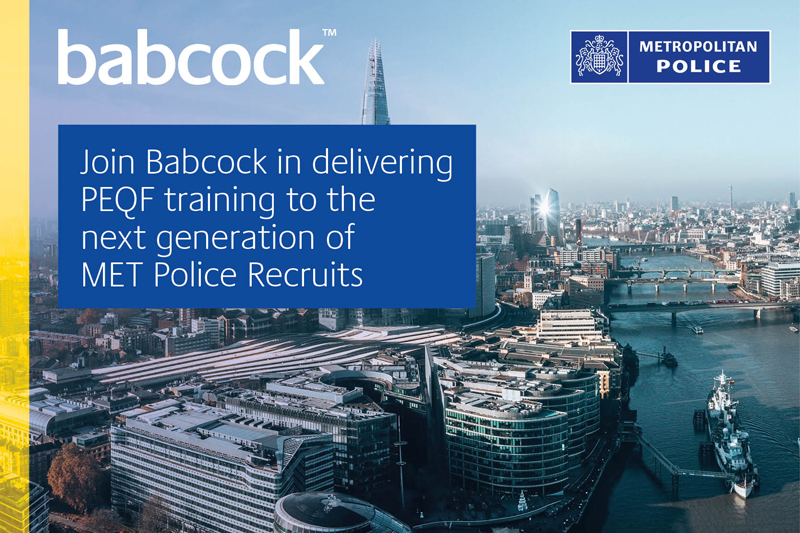For Dom Houlison – as with many other police officers and staff – the catalyst for embarking on a career in policing was his own experience of crime, and the desire to “make a difference” as a result.
Working as a freelance technician in the entertainment industry, Dom was a victim of crime in the West End when he first moved to London: “I know it sounds a bit cheesy, but I thought ‘I want to do something about this’,” he explained. “And that was a bit of a turning point for me. I felt like I could make a difference in terms of policing.”

Dom Houlison worked for the Met as a Special Constable then worked in the force’s Professionalism Directorate focused on embedding the policing education qualification framework (PEQF) locally at BCU level before applying to become a police lecturer with Babcock
Although he was still building his freelance career, Dom signed up to become a Special Constable with the Metropolitan Police. Over the next five years, he was able to combine his working life with volunteering with the Met in a range of roles, including on response and Safer Neighbourhood teams, and in various BCU posts and capacities, before becoming involved in learning and development.
“It just became one of those passions; I thought to myself, if a job ever comes up in learning and development full-time with the force, I would go for it; so it wasn’t long before I transitioned to a staff role within the Met.”
Dom’s role in the force’s Professionalism Directorate focused on embedding the policing education qualification framework (PEQF) locally at BCU level. And having become well acquainted with the PEQF pathways, when the opportunity again arose to make a difference – this time in helping to train new recruits as part of the team for the Met’s learning partner, Babcock – Dom knew it was the right thing for him.
Induction as a Police Lecturer
“When you join there’s a four-week induction programme that covers the curriculum, some core teaching skills, and how students – in the policing context – learn. Then you undertake some shadowing sessions where you can get to see other practitioners in action, before you start to take bits of a session, get some feedback, and in that supportive way, improve and develop,” said Dom, who teaches on the Police constable degree apprenticeship (PCDA) and Degree-holder entry programme (DHEP) courses.
Babcock have been brilliant in making sure that you develop in the role – they don’t expect you to come in and be perfect from the start”
Dom Houlison, Babcock Police Lecturer
“Babcock have been brilliant in making sure that you develop in the role – they don’t expect you to come in and be perfect from the start. There’s continuing professional development for tutors, and there’s quality assurance through lecture observations, so they are definitely making sure that we’re all at a high standard and working towards fellowship of the Higher Education Authority.
“And I actually didn’t have my PGCHE when I started the job, so I’m doing that now – funded by Babcock, which again is brilliant. It runs alongside my day-to-day teaching, it’s extremely flexible, and its professionalising what I’m doing.”
A wide range of backgrounds
As well as relishing the opportunity to develop new skills, Dom has been impressed and encouraged by the diversity and wide-ranging backgrounds of both the lecturing team he has joined, and the new recruits they are training.
“There is plenty of diversity among the lecturing team, in terms of gender and ethnic background,” said Dom. “Babcock’s message is, ‘we want to deliver innovative, modern training to our students that’s cutting-edge level’. That’s why we also want people from across the field and at different points in their careers to come and join us.
To see that you have coached and mentored a civilian and turned them into a PC, with a solid level of professionalism, and then see how far they’ve come, then get an odd message – ‘I made my first arrest’ or ‘I did my first stop and search’ – and you’re the first person they have told… that’s very heart-warming”
Dom Houlison, Babcock Police Lecturer
“Among the students, there’s a great mix of academic abilities, from those who already have a degree, to those who need functional skills training and extra support in terms of maths and English, alongside the very hands-on apprenticeship approach.
“What particularly surprised me was how switched-on the recruits are, regardless of whether they are academic. They are primarily young people coming through, although not all – we have some people coming through in their 40s, some in their 50s – but they are all really tuned-in to society, and to current events and what’s going on in London.”
That opportunity to ‘make a difference’ has already had an impact on Dom too: “Although it’s sad to see them leave, seeing them off at the end of that initial part of their journey is such a rewarding experience.
“To see that you have coached and mentored a civilian and turned them into a PC, with a solid level of professionalism, and then see how far they’ve come, then get an odd message – ‘I made my first arrest’ or ‘I did my first stop and search’ – and you’re the first person they have told… that’s very heart-warming.
“And it’s almost kind of exponential. You teach one person to help people and they can help 10 people, or they go on to teach other people. It’s the thought that how many people are those 30 officers going to save the lives of, going to give first aid to, and keep safe?
“Even just 30 people, every 17 weeks, you’re sending people out to keep London safe, and that’s just an amazing thing; it’s a full circle, and it’s why I joined policing to start with.”
So Dom’s advice to anyone considering applying for a post with Babcock? “I guess the key thing for me is, go for it. I know that sounds a little bit cheesy, but I didn’t think I could do it and I have.
“You can do it too. If you’re passionate and have a keen interest in teaching and learning, and you have knowledge within policing, then really just go for it.”
Find out more about becoming a police lecturer at Babcock delivering PEQF training to the next generation of Metropolitan Police recruits.
Role: Police Lecturers PEQF
Location: London
Salary: £45,900 rising to £48,450 after 6 months probation
Babcock is the Metropolitan Police Service’s (Met Police) learning partner, working with a collaboration of four London-based universities – Anglia Ruskin University, Brunel University London, University of East London and University of West London – to support the UK’s largest police service with the training of its new officer recruits.
The partnership with the Met Police will last until at least 2028, with a possibility to extend for a further two years, and is set at a maximum contract value of £309 million, dependent on the number of recruits trained under the programme.
Due to continued growth in volumes, we are looking to recruit a number of individuals with recent Policing experience to deliver highly engaging lecturer led lessons, role-plays and practical sessions to the next generation of police recruits. The role of a Lecturer is a rewarding position that will give you the opportunity to use your experience to guide and mentor students on their journey to becoming fully fledged police officers.
You’ll be part of a business that supports over 14,000 apprentices, we’ll provide you with all the training that you need to become a fully qualified Lecturer. During your training we will provide in-depth practical support from experts in this field as well as funding your PGCHE (if you don’t already have it).
What do I need to be able to do the role?
You will need to be degree educated (or equivalent) whilst also having up to date relevant operational experience in policing.
We would also like you to have experience in all of these areas:
- Excellent literacy and communication skills.
- Be a confident speaker, ideally with experience of delivering training sessions to groups of people or individuals.
- Ideally not have left a policing role more than 5 years ago, however we will consider candidates depending on experience since leaving.
What else do I need to know?
- Successful applicants will need NPPV1 via the Met Police vetting process and an enhanced DBS through the Disclosure and Barring Service, however this will be provided during on boarding.
- These roles are on a permanent basis.
- We will be recruiting for these roles on a rolling basis – please express your interest early.
If you feel you have the necessary skills and experience then we would love to hear from you. Please get in touch with either Jed Williams ([email protected]) or Simon James ([email protected]) who are leading the recruitment for this programme.
We are committed to embracing the advantages people with different experiences, skills and outlooks can bring to our teams. We encourage a diverse and inclusive employee base where each person feels respected and able to fulfil their potential.
About Babcock International
Babcock combines the best commercial practice with the values and principles of the public sector, working with schools and settings, emergency services, local authorities, colleges, government departments and agencies to improve the life chances of all children and young people.
From full turnkey projects, to the management and maintenance of specialist training facilities, Babcock is committed to developing and delivering training solutions which meet the specific and safety-centric needs of our Emergency Services customers. Our understanding of the Emergency Services operational environment, particularly around fire and rescue, means that we can deliver a suitably qualified, competent and safe workforce into your service.
Our long term strategic partnerships enable learners, customers and communities to fulfil their potential through world-class education.
If you are degree educated (or equivalent) whilst also having up to date relevant operational experience in policing and would like to know more about becoming a police lecturer, please click here



